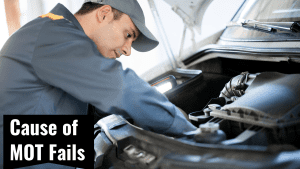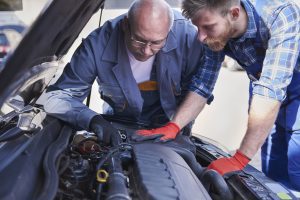Owning a car comes with the responsibility of ensuring its roadworthiness and compliance with safety standards. In the USA, the MOT test, also known as the safety inspection, is a crucial aspect of maintaining a vehicle’s reliability and legality. If i you, can you drive a car with a failed mot?. I think you will be give answer absoloutly not. This article will highlight the top 10 reasons why vehicles fail MOT tests and provide valuable insights on how car owners can avoid costly repairs, ensuring their cars remain roadworthy.

01. Inadequate Braking System
Explanation of the importance of a functioning braking system
The braking system is undoubtedly one of the most critical safety components of a vehicle. It plays a crucial role in preventing accidents and ensuring driver and passenger safety. During an MOT test, brake-related failures are common reasons for vehicles not meeting the required standards. Issues such as worn-out brake pads, damaged brake lines, or malfunctioning ABS can compromise the effectiveness of the braking system, leading to test failures.
Common brake-related issues leading to MOT test failures
- Worn Brake Pads: Over time, brake pads wear down, affecting their ability to generate sufficient friction to stop the vehicle safely. Excessive wear can lead to MOT test failures.
- Damaged Brake Lines: Brake lines can corrode, develop leaks, or suffer from other forms of damage. Such issues compromise the brake fluid’s integrity, leading to reduced braking performance and potential MOT failures.
- Malfunctioning Anti-lock Braking System (ABS): The ABS is responsible for preventing wheel lock-up during braking. If the ABS is not functioning correctly, it can result in an MOT failure.
Tips for regular brake inspections and maintenance
To avoid MOT failures related to the braking system, car owners should:
– Regularly check brake pads for wear and replace them if necessary.
– Inspect brake lines for signs of damage or leakage and address any issues promptly.
– Ensure the ABS is working correctly by checking for warning lights and seeking professional assistance if needed.
– Consider professional brake inspections and servicing to ensure optimal performance and safety.
02. Defective Lights and Signals
Significance of proper lighting and signaling for road safety
Proper lighting and signaling are crucial for visibility on the road, allowing drivers to communicate their intentions effectively and enhancing overall safety. During an MOT test, failures related to lights and signals are common, leading to vehicles not meeting the required standards.
Common lighting and signal failures during MOT tests
- Faulty Headlights: Dim or misaligned headlights can significantly reduce visibility, making it difficult for drivers to see the road ahead and for other motorists to see the vehicle.
- Non-functioning Brake Lights: Brake lights that do not illuminate when the brake pedal is pressed can pose a significant risk on the road, as drivers behind may not be aware when the vehicle is slowing down or stopping.
- Defective Turn Signals: Inoperable or malfunctioning turn signals can lead to confusion and increase the risk of accidents, as other drivers may not be aware of the intended direction change.
Advice on checking and replacing faulty lights and signals
To ensure that lights and signals are in proper working condition:
- – Regularly inspect headlights, taillights, brake lights, turn signals, and hazard lights for functionality.
- – Replace any bulbs that have burnt out or are dim.
- – Adjust headlight alignment as necessary to ensure optimal visibility.
- – Clean light lenses to remove dirt and grime that may reduce brightness.
- – Seek professional assistance if electrical issues or complex repairs are required.
03. Exhaust Emissions Failures
Understanding emission standards and their impact on MOT tests
“Can you drive a car with a failed mot? Do You Know Emission imact a MOT Test? Emission standards are in place to regulate the amount of pollutants released by vehicles, promoting environmental sustainability and reducing air pollution. During MOT tests, vehicles are evaluated for excessive exhaust emissions.
Causes of excessive exhaust emissions
Excessive exhaust emissions can result from various factors, including:
- Malfunctioning Catalytic Converter: A faulty catalytic converter may not effectively convert harmful gases into less harmful substances, leading to increased emissions.
- Oxygen Sensor Issues: A malfunctioning oxygen sensor can impact the air-fuel mixture, leading to improper combustion and higher emissions.
- Engine Misfires: Misfires can result in incomplete combustion, leading to increased emission levels.
Tips for keeping the exhaust system in good condition
To minimize the risk of exhaust emissions failures:
- – Regularly inspect the exhaust system for leaks, damage, or rust.
- – Replace a faulty catalytic converter or oxygen sensor promptly.
- – Address any engine misfires through proper maintenance and tune-ups.
- – Use high-quality fuel and follow the manufacturer’s recommendations for fuel additives, if applicable.
04. Worn-out Tyres
Importance of proper tyre maintenance and its role in MOT tests
Tyres are crucial for safe handling, grip, and overall vehicle performance. During MOT tests, tyres with excessive wear or insufficient tread depth can lead to test failures.
Common tyre-related failures and tread depth requirements
- Insufficient Tread Depth: In the USA, the legal minimum tread depth for passenger vehicles is typically 2/32 of an inch. Tyres with tread depth below this limit can compromise traction and safety.
- Uneven Tyre Wear: Uneven wear patterns can indicate misalignment, suspension issues, or improper tyre inflation, which may lead to MOT failures.
Guidance on tyre inspections, rotations, and replacements
To maintain roadworthy tyres and pass MOT tests:
- – Regularly check tyre tread depth using a tread depth gauge or the penny test method.
- – Rotate tyres as recommended by the vehicle manufacturer to promote even wear.
- – Inspect tyres for any signs of damage, such as cuts, bulges, or sidewall cracks, and replace them if necessary.
- – Maintain proper tyre inflation by checking tyre pressure regularly.
- – Consider professional wheel alignment and balancing to ensure even wear and optimal handling.
05. Faulty Suspension System
Overview of the suspension system’s role in vehicle safety
The suspension system plays a crucial role in providing a smooth and controlled ride, as well as ensuring proper handling and stability. A faulty suspension system can compromise vehicle safety and result in MOT test failures.v So that if can you drive a car with a failed mot that is really faulty.
Suspension-related issues leading to MOT test failures
- Worn-out Shock Absorbers: Deteriorated shock absorbers can lead to poor handling, increased braking distances, and reduced control of the vehicle, resulting in test failures.
- Damaged Suspension Components: Issues such as worn-out bushings, ball joints, or control arms can affect the suspension’s integrity and compromise safety.
Suggestions for regular suspension maintenance and repairs
To maintain a roadworthy suspension system:
- – Periodically inspect shock absorbers for leaks, signs of wear, or diminished performance.
- – Look for signs of damage or wear on suspension components and address them promptly.
- – Follow the vehicle manufacturer’s recommendations for suspension system maintenance, including lubrication and tightening of relevant components.
- – Seek professional assistance for complex suspension repairs or replacements.
06. Faulty Steering Mechanism
Understanding the significance of a well-functioning steering system
A properly functioning steering mechanism ensures precise control and maneuverability of the vehicle. During MOT tests, failures related to the steering system can result in test failures and compromise overall road safety.
Common steering-related failures during MOT tests
- Excessive Steering Play: Excessive play in the steering wheel can indicate issues with steering linkages, ball joints, or the steering gearbox, leading to MOT failures.
- Power Steering Malfunctions: If the power steering system fails to operate correctly, it can affect the ease of steering and lead to MOT test failures.
Advice on steering system inspections and repairs
To maintain a roadworthy steering mechanism:
- – Regularly check for excessive steering play and seek professional attention if detected.
- – Inspect power steering fluid levels and address any leaks or malfunctions promptly.
- – Follow the manufacturer’s recommendations for power steering system maintenance and fluid replacement.
- – Seek professional assistance for steering system repairs or adjustments as necessary.
07. Faulty Steering Mechanism
Understanding the significance of a well-functioning steering system
A properly functioning steering mechanism ensures precise control and maneuverability of the vehicle. During MOT tests, failures related to the steering system can result in test failures and compromise overall road safety.
Common steering-related failures during MOT tests
- Excessive Steering Play: Excessive play in the steering wheel can indicate issues with steering linkages, ball joints, or the steering gearbox, leading to MOT failures.
- Power Steering Malfunctions: If the power steering system fails to operate correctly, it can affect the ease of steering and lead to MOT test failures.
Advice on steering system inspections and repairs
To maintain a roadworthy steering mechanism:
- – Regularly check for excessive steering play and seek professional attention if detected.
- – Inspect power steering fluid levels and address any leaks or malfunctions promptly.
- – Follow the manufacturer’s recommendations for power steering system maintenance and fluid replacement.
- – Seek professional assistance for steering system repairs or adjustments as necessary.
08. Insufficient Fluid Levels
Overview of vital fluids and their role in vehicle performance
Proper fluid levels are essential for the optimal functioning of various vehicle systems. During MOT tests, inadequate fluid levels can lead to test failures and potentially affect the vehicle’s performance and safety.
Consequences of low fluid levels during MOT tests
Insufficient fluid levels can result in:
- Engine Overheating: Low coolant levels can lead to engine overheating, which can cause severe damage to the engine and result in MOT failures.
- Transmission Issues: Insufficient transmission fluid levels can lead to poor shifting, slipping, or other transmission-related problems, impacting the vehicle’s performance and resulting in test failures.
Advice on regular fluid checks and maintenance
To maintain adequate fluid levels and pass MOT tests:
- – Regularly check engine coolant, brake fluid, power steering fluid, and transmission fluid levels according to the vehicle manufacturer’s recommendations.
- – Top up fluids as necessary, following the correct fluid specifications and using the recommended products.
- – Address any fluid leaks promptly and have the vehicle inspected if fluid loss is recurrent.
09. Faulty Seatbelts and Restraint Systems
Significance of seatbelt and restraint system safety
Seatbelts and restraint systems are critical for occupant protection and minimizing injuries during accidents. During MOT tests, failures related to seatbelts and restraint systems can result in test failures and compromise occupant safety.
Common failures related to seatbelts and restraints during MOT tests
Failures may include:
- Malfunctioning Seatbelt Buckles: Seatbelt buckles that do not latch properly or release unintentionally can lead to MOT failures.
- Damaged or Frayed Seatbelts: Seatbelts with cuts, frays, or signs of wear may not provide adequate protection and can result in test failures.
Guidance on regular inspections and necessary repairs
To ensure proper seatbelt and restraint system functionality:
- – Regularly inspect seatbelt buckles for proper operation, ensuring they latch securely.
- – Check seatbelt webbing for damages, frays, or signs of wear, and replace worn-out or damaged seatbelts promptly.
- – Seek professional assistance for seatbelt and restraint system repairs or replacements to ensure proper installation and functionality.
10. Lack of Proper Documentation
Importance of having accurate and up-to-date vehicle documentation
Vehicle documentation provides vital information about the vehicle’s history, maintenance records, and compliance with legal requirements. During MOT tests, missing or incomplete paperwork can result in test failures. If can you drive a car with a failed mot. That is absoloutly Illegal.
Consequences of missing or incomplete paperwork during MOT tests
Failure to provide necessary documentation can lead to:
- Inconvenience and Delays: Without proper documentation, the MOT test may not proceed, resulting in rescheduling and additional time and effort.
- Potential Fines or Penalties: In some cases, missing or incomplete paperwork may lead to penalties or fines for non-compliance.
Tips for organizing and maintaining essential vehicle documents
To ensure a smooth MOT test process:
- – Keep all vehicle documentation, including registration, insurance, service records, and MOT certificates, in a secure and organized manner.
- – Regularly update and renew necessary documents to ensure they are valid and up to date.
- – Prioritize maintaining a copy of the most recent MOT certificate, as it serves as proof of compliance during the test.
Conclusion:
In conclusion. I wanna repeat this, can you drive a car with a failed mot? . No must be not! maintaining a roadworthy vehicle is crucial for both safety and legal compliance. By understanding the top 10 reasons why vehicles fail MOT tests and following the provided tips on inspection and maintenance, car owners can avoid costly repairs and ensure their vehicles remain in optimal condition to pass MOT tests. Regular brake inspections and maintenance, proper lighting and signaling, emission control, tire maintenance, suspension and steering system checks, windscreen and wiper care, fluid level monitoring, seatbelt and restraint system functionality, and keeping proper documentation are all key factors in ensuring a roadworthy vehicle.
By addressing these areas proactively, car owners can minimize the risk of MOT test failures, improve overall vehicle safety, and avoid costly repairs down the line. It is important to prioritize regular inspections, maintenance, and necessary repairs to address any issues promptly and maintain the roadworthiness of the vehicle.
However, it’s crucial to remember that while some maintenance tasks can be done by car owners themselves, certain complex repairs or inspections may require the expertise of professional car repair services. These professionals have the knowledge, experience, and specialized equipment to accurately diagnose and rectify any issues identified during MOT tests.
Additionally
staying updated with the latest regulations and requirements regarding MOT tests is essential. Standards and regulations may vary by state, so it’s important to consult the relevant authorities or trusted automotive resources to ensure compliance.
By being proactive and diligent in vehicle maintenance, car owners can not only pass MOT tests but also ensure the safety of themselves, their passengers, and other road users. Regular inspections, timely repairs, and the adherence to safety standards will contribute to a reliable, roadworthy vehicle that can provide peace of mind and a smooth driving experience.
So that if can you drive a car with a failed mot its can be very bad for you!
Remember, the MOT test is not just a legal obligation but also an opportunity to ensure that your vehicle meets the necessary safety standards. So, prioritize regular maintenance, address any issues promptly, and enjoy the peace of mind that comes with driving a well-maintained and roadworthy vehicle. If you want to mot test service centre in milton keynes – MK12autocare is the best car repair services centre in milton keynes











